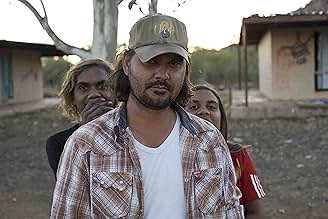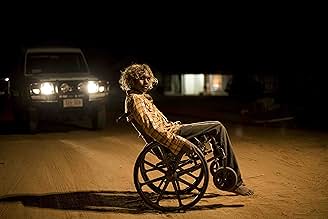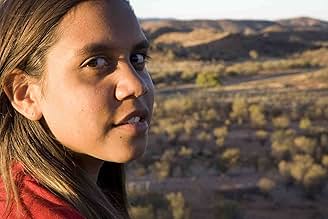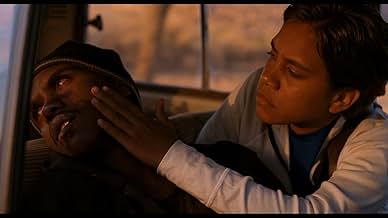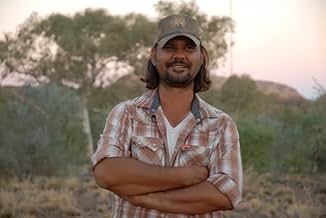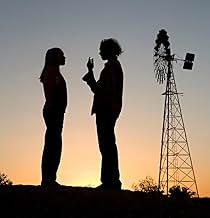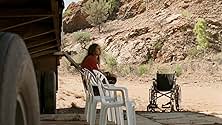VALUTAZIONE IMDb
7,0/10
3849
LA TUA VALUTAZIONE
Un ragazzo che sniffa colla e la sua ragazza fuggono dalla comunità aborigena senza speranza controllata dal governo in cui vivono.Un ragazzo che sniffa colla e la sua ragazza fuggono dalla comunità aborigena senza speranza controllata dal governo in cui vivono.Un ragazzo che sniffa colla e la sua ragazza fuggono dalla comunità aborigena senza speranza controllata dal governo in cui vivono.
- Regia
- Sceneggiatura
- Star
- Premi
- 22 vittorie e 14 candidature totali
Mitjili Napanangka Gibson
- Nana
- (as Mitjili Gibson)
Matthew Gibson
- Samson's Brother
- (as Matthew 'MG' Gibson)
- …
Noreen Robertson Nampijinpa
- Community Lady
- (as Noreen Robertson)
Kenrick Martin
- Wheelchair Boy
- (as Kenrick 'Ricco' Martin)
Recensioni in evidenza
This is an uncanny film which shows a side to Australia most Australians would prefer not to know. First Time Director Thornton presents a series of small tragedies without preaching, moralising and mostly without words, in a similar way to Cronenberg's masterpiece Spider. He creates an uncomfortable atmosphere, which is confronting but wholly realistic.
The main characters rarely speak. Delilah speaks only in an aboriginal tongue. Samson says one word in the whole movie, and that is a laboured attempt to say his own name. Other characters speak English freely, creating a point of difference between Samson and Delilah and the world they encounter. It also alienates them further.
This film gives a snapshot of the effects of substance abuse, extreme poverty, the violence within aboriginal society as well as the violence directed at it and worse of all the general apathy of the white population to these issues. The acting is unpretentious, the soundtrack sparse and conversation is absent.
The tragedies experienced by aboriginal people have no simple solutions. The first step toward a solution is to be aware that there is a problem. This film does that in spades. The sparse non-verbal presentation makes the viewer have to work to interpret the images shown. In the process one may glean an intuitive understanding, which is often the role of art.
Highly recommended.
The main characters rarely speak. Delilah speaks only in an aboriginal tongue. Samson says one word in the whole movie, and that is a laboured attempt to say his own name. Other characters speak English freely, creating a point of difference between Samson and Delilah and the world they encounter. It also alienates them further.
This film gives a snapshot of the effects of substance abuse, extreme poverty, the violence within aboriginal society as well as the violence directed at it and worse of all the general apathy of the white population to these issues. The acting is unpretentious, the soundtrack sparse and conversation is absent.
The tragedies experienced by aboriginal people have no simple solutions. The first step toward a solution is to be aware that there is a problem. This film does that in spades. The sparse non-verbal presentation makes the viewer have to work to interpret the images shown. In the process one may glean an intuitive understanding, which is often the role of art.
Highly recommended.
10manjits
Don't go by the fact, it's an Australian film made by a virtually unknown aboriginal writer-director-cinematographer Warwick Thornton on a shoestring budget with untrained first-time actors. "Samson and Delilah" is a movie Robert Bresson, Ingmar Bergman, Werner Herzog or Federico Fellini would have been proud of at the pinnacle of their glory. (And in the true Australian tradition, the next movie by Warwick Thornton may turn out to be a total dud – whatever happened to Stephan Elliott? – but I hope not.)
It's made in the austere style of minimalist emotions pioneered by Bresson in 1950s and 60s. There is no background music, other than a few recordings the two characters listen to on radio or tape; and hardly any dialogues (the two 14-year old aboriginal protagonists don't exchange a single word throughout the film).
Getting bored? Don't be. It's a profoundly touching and satisfying art film, the like of which we have not seen too many in the history of world cinema. It would easily be in my personal top-50 best movies of all times. However, if the best of Robert Bresson, Ingmar Bergman, Werner Herzog and Federico Fellini bore you, then please don't bother.
It's made in the austere style of minimalist emotions pioneered by Bresson in 1950s and 60s. There is no background music, other than a few recordings the two characters listen to on radio or tape; and hardly any dialogues (the two 14-year old aboriginal protagonists don't exchange a single word throughout the film).
Getting bored? Don't be. It's a profoundly touching and satisfying art film, the like of which we have not seen too many in the history of world cinema. It would easily be in my personal top-50 best movies of all times. However, if the best of Robert Bresson, Ingmar Bergman, Werner Herzog and Federico Fellini bore you, then please don't bother.
Those of us who have travelled the Australian Outback will recognise the backdrop to "Samson and Delilah" – aboriginals living in squalid housing amidst household garbage, derelict cars and ubiquitous dust. Warwick Thornton sets himself the difficult task of depicting the monotony, hopelessness and despair of this existence without boring and depressing the audience. To a large measure he succeeds, although this film will not appeal to those you go to the cinema to escape the real world. Thornton's great skill is to convey the developing relationship between the star-crossed lovers via body language rather than dialogue. The performances by untrained actors, especially Marissa Gibson (Delilah), are exceptional. Your view of this film is likely to be determined by whether you can empathise with the main characters and their inevitable misadventures. I certainly did, although I concede Samson's character was underdeveloped and very hard to like. Appropriately, the movie ends with a glimmer of hope based on the resilience and determination of aboriginal women.
This movie is one that demands something from the movie goer. It needs to grow on you slowly. The pace is slow and if the audience is patient and prepared to give something back to the film it will affect you. I found it repetitive at first but rather than switching off I stayed with it and was glad I did. The acting is excellent. It is not a movie for the feint hearted and it is depressing. It should be. It is a film about hopelessness. Its hard to like Samson yet there are moments he smiles and your heart goes out to him. Della is superb as is the old woman and the drunken man who lets them share his home. Films like this should be made as there is an honesty you rarely see, the film is not dogged by political correctness. There is a danger people will not feel compassion for the characters as they are not glamorous likable people. The more you allow the film to touch you and you open your heart and your mind you will feel great compassion and love.
As an Australian and someone who loves stories that feel raw and authentic, Samson and Delilah left a real impression on me. It's a tough film to watch, but that's exactly why it works, it doesn't sugarcoat anything. Warwick Thornton has done an incredible job of capturing the isolation, struggles, and resilience of life in remote Indigenous communities.
The performances by Rowan McNamara and Marissa Gibson are remarkable, especially considering it was their first time acting. They say so much with so little dialogue, and that silence really makes you feel the weight of their lives. The cinematography is brilliant, showing the beauty of the land alongside the harsh reality of their circumstances.
But I do think the pacing dragged a bit in places, which made it harder to stay fully engaged. While the minimalism is powerful, at times it felt like the film needed just a bit more story to balance the heavy atmosphere.
That said, it's an important and beautifully made film that tells a story so many Australians don't really think about. It's confronting and heartbreaking, but it stays with you long after the credits roll. I'm glad I watched it, and I think it's the kind of film that everyone should see at least once.
The performances by Rowan McNamara and Marissa Gibson are remarkable, especially considering it was their first time acting. They say so much with so little dialogue, and that silence really makes you feel the weight of their lives. The cinematography is brilliant, showing the beauty of the land alongside the harsh reality of their circumstances.
But I do think the pacing dragged a bit in places, which made it harder to stay fully engaged. While the minimalism is powerful, at times it felt like the film needed just a bit more story to balance the heavy atmosphere.
That said, it's an important and beautifully made film that tells a story so many Australians don't really think about. It's confronting and heartbreaking, but it stays with you long after the credits roll. I'm glad I watched it, and I think it's the kind of film that everyone should see at least once.
Lo sapevi?
- QuizWarwick Thornton cast his own brother Scott in the film as Gonzo, despite his sibling being an alcoholic since the age of 16. Thornton insisted that his brother go into rehab before starting on the movie. Scott managed to clean up for the film but relapsed back into alcoholism two weeks after shooting completed.
- ConnessioniFeatured in At the Movies: Cannes Film Festival 2009 (2009)
I più visti
Accedi per valutare e creare un elenco di titoli salvati per ottenere consigli personalizzati
- How long is Samson & Delilah?Powered by Alexa
Dettagli
- Data di uscita
- Paese di origine
- Siti ufficiali
- Lingue
- Celebre anche come
- Samson and Delilah
- Luoghi delle riprese
- Aziende produttrici
- Vedi altri crediti dell’azienda su IMDbPro
Botteghino
- Lordo in tutto il mondo
- 2.528.907 USD
- Tempo di esecuzione
- 1h 40min(100 min)
- Colore
- Mix di suoni
- Proporzioni
- 1.85 : 1
Contribuisci a questa pagina
Suggerisci una modifica o aggiungi i contenuti mancanti

